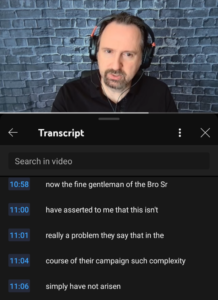Alexander Macris, in a recent video, set a whole bunch of really smart stuff and you should go watch that video even though some of it is wrong. Let’s talk about it, and get it written down for posterity.
For context, he is laying out one of the perceived difficulties of using Jeffrogaxian timekeeping in your D&D campaign. He paints a word picture of a potentially game breaking paradox that might occur if you use Jeffrogaxian timekeeping. Once Party A has ventured into the future, the events of their adventuring lock in the events at their location during that time period. If Party B can move faster than Part A, they could take action to interrupt or spoil the events that have already occurred in Paty A’s session. He posits a few ways to prevent that from happening, but laments that all of the narrative solutions and the DM Fiat solution of barring those actions from occurring are tantamount to limitations on player agency.
He teases us with a solution that he plans to elucidate in a future video, but we don’t have access to that yet. Until then, let me just point out that one of the rules of Jeffrogaxian timekeeping is ‘players can’t take action that retcons previously established events’, which is the same thing as saying no paradoxes.
Enforcing the rules of the game is not a limitation of player agency. Telling plParty B they cannot beat the calendar to interrupt and retcon established actions by Party A is rule enforcement. It is no more a limitation on player agency then telling a player his fighter cannot cast a spell, or that his magic user cannot cast cure light wounds…
But there were a couple of other wrinkles involved.
He glosses over the question of intel. How did the second party get information about what the first party is doing in time to make the attempt to beat the calendar?
But hey, this is a genre where magic abounds. It could happen. One well-placed wish spell can work wonders. A string of them can nuke a whole campaign, and this is where the question of allowing actions that retcon other actions starts to show its fragility. Once you open that retcon door there is no limit to what happens next. Why use the wish to gain a little Intel to race the calendar? Why not just use the wish to go back in time a full month? Or 20 years,to the birth of Party A and strangle them in their crib?
If you thought World War Wish was a convoluted nightmare to resolve, try resolving a Time War in D&D. Or you could implement a no paradox rule, and never have to face this quandary.
There’s a deeper issue involved here though, and that’s one of friendship. When you attempt to retcon the actions that players took during a session, you’re robbing them of the time they spent playing the game. You, as a player, are robbing them of their agency. It’s a jerk move, and one alex, to his credit, once to prohibit in as gentle a manner as possible when he writes games like Adventurer Conqueror King.
He edges up against this observation here:

When he’s right, he’s right. When you game with good people, this isn’t an issue.

